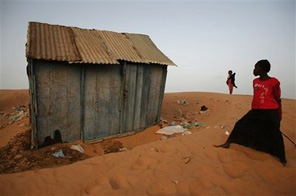Mauritania holds post-coup vote
NOUAKCHOTT: A former military general who ousted this Islamic nation's first freely elected president is vying to become its legitimate ruler in elections Saturday to return power to civilian rule.
Mohamed Ould Abdel Aziz, who toppled former President Sidi Ould Cheikh Abdallahi in August, is a front-runner among nine candidates on the ballot. Voting opened Saturday morning and was due to close 12 hours later.
Aziz resigned from the army post and the junta he led in April so he could run as a civilian. But Abdallahi's overthrow made clear the military wields real power, no matter who is president.
The vote epitomizes a half-century-old struggle still being waged across Africa against the ever-strong reign of autocratic strongmen. At stake is whether Mauritania can really turn its back on an era of military rule, while at the same time taking a hard line against an encroaching al-Qaida presence in the region.
Late Friday, police in the capital, Nouakchott, exchanged fire with Islamic extremists suspected of gunning down an American teacher in the capital last month. Police detained two men, including one wearing explosives wrapped around his waist, according to a Nouakchott police chief who declined to be identified because he is not authorized to speak to the media.
After casting his ballot in the capital, a white-robed Aziz confirmed that two Islamic extremists were arrested in the incident. He described the pair as "terrorists." Police erroneously reported earlier that one suspect had escaped and another had been killed.
Al-Qaida had claimed responsibility for the American's death, alleging he was trying to convert Muslims to Christianity.
Hundreds of international observers are monitoring Saturday's poll, and most expect it to be free and fair.
Aziz vowed he would win enough support to avoid a runoff, and "bring change, development and prosperity" to Mauritania.
If no candidate wins the 50 percent majority needed to avoid a runoff, a second round will be held Aug. 1.
Though nine candidates are contesting, only four are considered serious contenders.
First among them is Aziz, who helped engineer the nation's last two coups and is praised for having ended two decades of harsh dictatorship with the first one in 2005. Also running is Col. Ely Ould Mohamed Vall, who led the 2005 junta, and Ahmed Ould Daddah, a popular civilian opposition leader who was runner-up in 2007.
All three are so-called white Moors — Arabs who make up 30 percent of the population but who overwhelmingly dominate the government, the military and business sectors. Black Moors, who are darker-skinned and consider themselves Arab, account for around 40 percent, while black Africans, some of whom speak languages common with southern neighbor Senegal, account for the rest.
Parliament speaker Messaoud Ould Boulkheir — a Black Moor whose parents were slaves in an era before the practice was outlawed — is also on the ballot. Backed by Abdallahi, he is also thought to have a chance at winning.
Both Boulkheir and Daddah have promised to support each other in a second round, and united, the two candidates could make for formidable opposition to Aziz. Both men are promising to end Aziz's recent era of coups and put Mauritania back on the democratic path.
Aziz, meanwhile, has had a massive head-start on his competitors with months at the helm of power. He has taken advantage of the machinery of state to cast himself as "president of the poor," in part by dramatically lowering prices on electricity, water, sugar, and gas by as much as 30 percent. He has also tried to win over a skeptical populace by paving roads and carrying out other public works projects.
Last year's coup — Mauritania's fifth since independence in 1960 — was met with condemnation abroad and has fueled unprecedented political opposition at home.
In June, an Abdallahi-backed opposition front forced Aziz to accept a deal that saw the junta replaced with a government of national unity that is overseeing the ballot.
Before the accord, the vote had been set to go ahead without opposition participation. Their absence would have given Aziz certain victory, but deprived his win of any legitimacy — and with it, the prospect of restarting billions of dollars in aid that had been pledged toward development.
The post-coup isolation imposed by Western powers has forced Mauritania to look for support from the Arab world. One casualty in doing so: Mauritania severed ties with Israel in the wake of the war in Gaza this year. Mauritania had been only one of three Arab League nations maintaining diplomatic relations with the Jewish state, a stance taken in the 1990s to woo the West.
Washington, for its part, has walked a tightrope: it never recognized the junta, but it wants to keep the country from sliding toward extremism. The U.S. sees Mauritania as a bulwark against growing al-Qaida activity in North Africa, which has spread south of Algeria into Mali, Niger and Mauritania in recent years.
Though many African nations have successfully evolved from dictatorships, others are "backsliding," in the words of President Barack Obama. In the last year alone, the continent has seen coups in Guinea and Madagascar, the assassination of Guinea-Bissau's president, and Niger's leader fighting to stay in power past his legal two-year mandate.
About one-third of Mauritania's 3.5 million people are registered to vote.






